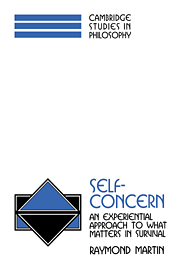
-
Select format
-
- Publisher:
- Cambridge University Press
- Publication date:
- March 2010
- December 1997
- ISBN:
- 9780511663826
- 9780521592666
- 9780521061742
- Dimensions:
- (216 x 138 mm)
- Weight & Pages:
- 0.362kg, 184 Pages
- Dimensions:
- (216 x 138 mm)
- Weight & Pages:
- 0.252kg, 184 Pages
You may already have access via personal or institutional login- Series:
- Cambridge Studies in Philosophy
Book description
This book is a major contribution to the philosophical literature on the nature of the self, personal identity and survival. Its distinctive methodology is one that is phenomenologically descriptive rather than metaphysical and normative. On the basis of this approach Raymond Martin shows that the distinction between self and other is not nearly as fundamental a feature of our so-called egoistic values as has been traditionally thought. He explains how the belief in a self as a fixed, continuous point of observation enters into our experience of ourselves and the world. He also reveals the explosive implications this thesis has for recent debates over personal identity and what matters in survival. This is the first book of analytic philosophy directly on the phenomenology of identity and survival. It builds bridges between analytic and phenomenological traditions and, thus, to open up a new field of investigation.
Reviews
"[Martin's] phenomenological investigation is extremely lucid and compelling, suggestive of new and fruitful ways in which philosophers can approach questions about survival and what matters." D.L.J., Ethics
Contents
Metrics
Altmetric attention score
Full text views
Full text views help Loading metrics...
Loading metrics...
* Views captured on Cambridge Core between #date#. This data will be updated every 24 hours.
Usage data cannot currently be displayed.
Accessibility standard: Unknown
Why this information is here
This section outlines the accessibility features of this content - including support for screen readers, full keyboard navigation and high-contrast display options. This may not be relevant for you.
Accessibility Information
Accessibility compliance for the PDF of this book is currently unknown and may be updated in the future.


